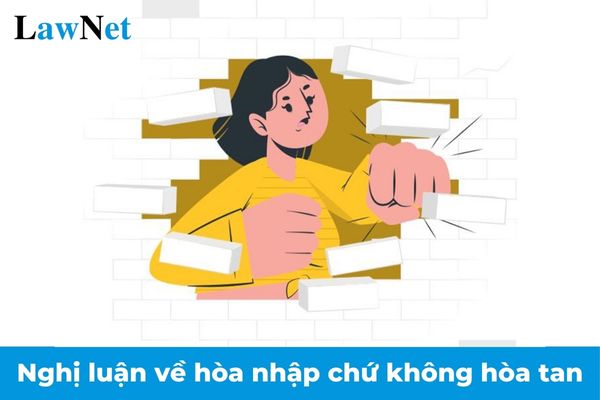What is the sample argumentative essay on integration without assimilation? Who will conduct the assessment via feedback for lower secondary school students in Vietnam?
What is the sample argumentative essay on integration without assimilation?
"Integration without Assimilation" is a critical principle in building personal, community, and national identity, especially in the context of increasing international integration.
Students can refer to the following sample argumentative essay on integration without assimilation:
| In the context of globalization occurring vigorously around the world, the exchange, learning, and adaptation to new values are inevitable. However, amidst the wave of changes, we need a living principle to both absorb the good from outside and maintain our distinct values. This is the spirit of "integration without assimilation" – an important compass in all areas of life. "Integration" means opening ourselves to absorb the quintessential values, culture, economy, and science from outside, participating, and adapting to the common flow of humanity. On the other hand, "assimilation" implies the loss of individual identity, being assimilated or overly dependent on external factors. "Integration without assimilation" is a positive attitude where individuals selectively embrace suitable elements while preserving and promoting their core values. This is not only a principle for individual survival and development but also a sustainable path for a nation to integrate internationally. Firstly, the principle of "integration without assimilation" plays an important role in preserving national cultural identity. In the era of globalization, cultural exchange is becoming increasingly prevalent. Vietnam, with its culturally rich identity, has embraced many values from other cultures like international music, cinema, fashion, or cuisine. However, alongside assimilation, we must preserve traditional characteristics such as the Vietnamese language, ao dai, folk songs, or traditional festivals. If we blindly follow foreign trends, forgetting our roots, our national cultural identity will gradually fade, making us a vague entity in the international community. Preserving and promoting traditional culture is the way for Vietnam to assert itself in the diversity of the world. Not only in culture, but the spirit of "integration without assimilation" is also effectively applied in the economic field. Globalization has brought Vietnam many opportunities for cooperation and economic development. Attracting foreign investment, adopting advanced technology, or improving management models are important steps to help the country develop. However, we cannot be entirely dependent on foreign advantages or let foreign enterprises overshadow local businesses for short-term benefits. A typical example is Vietnam's electronics industry: while leveraging global supply chains, we also need to develop "Made in Vietnam" technology products to assert the national brand and build an independent economy. The spirit of "integration without assimilation" is also particularly necessary in education and personal development. In the era of openness, we have the opportunity to access many advanced, modern learning methods from developed countries. Students can learn in the free, creative style of the West. But at the same time, traditional moral values such as respect for teachers, gratitude to family, and the spirit of solidarity must still be upheld. An ideal young Vietnamese is not only someone knowledgeable about the world but also someone who carries national pride and consciousness in preserving the cultural values of the country. However, implementing "integration without assimilation" is not easy. In reality, many cases of "assimilation" stem from blindly following trends. Many young people today are chasing foreign cultures, ignoring traditional values, leading to a loss of national identity. Conversely, there are also individuals and groups that are too conservative, closed-off, refusing to accept new developments, causing themselves to fall behind the era's development. Therefore, balancing acquisition and preservation requires each person to have resilience, selective thinking, and a high awareness of their core values. In conclusion, "integration without assimilation" is the right and necessary guiding principle in today's era. It helps individuals, communities, and nations develop while retaining their distinct identities. Only when we can absorb the good and beautiful from the outside while steadfastly maintaining traditional values can we assert our position in the relentless flow of the world. This is the path to sustainable development and contributes to enriching the world's diversity. |
Note: The content is for reference only.

What is the sample argumentative essay on integration without assimilation? Who will conduct the assessment via feedback for lower secondary school students in Vietnam? (Image from the Internet)
Who will conduct the assessment via feedback for lower secondary school students in Vietnam?
Under clause 1, Article 5 of Circular 22/2021/TT-BGDDT, assessment via feedback for lower secondary school students in Vietnam will be conducted by the following individuals:
- Teachers shall, in either spoken form or written form, provide feedback on implementation of training and learning tasks of students; provide feedback on improvement, advantages, and disadvantages of students during training and learning processes; provide feedback on training and learning results of students.
- Students shall, in either spoken form or written form, provide feedback on their implementation of training and learning tasks, improvement, advantages, and disadvantages.
- Parents of students, agencies, and organizations participating in education of students shall provide feedback on implementation of training and learning tasks of students.
What are the 02 assessment levels via feedback for lower secondary school students in Vietnam?
Under clause 1, Article 9 of Circular 22/2021/TT-BGDDT, the 02 assessment levels via feedback for lower secondary school students in Vietnam are as follows:
- In a semester, learning results of each subject of a student shall be concluded as either: “Đạt” (Qualified), or “Chưa đạt” (Unqualified).
+ Qualified: When the student attends all examination and assessment under this Circular and obtain assessment at Qualified category.
+ Unqualified: Remaining cases.
- In a school year, learning results of each subject of a student shall be concluded as either: “Đạt” (Qualified), or “Chưa đạt” (Unqualified).
+ Qualified: Learning results of the 2nd semester is placed in Qualified category.
+ Unqualified: Learning results of the 2nd semester is placed in Unqualified category.

